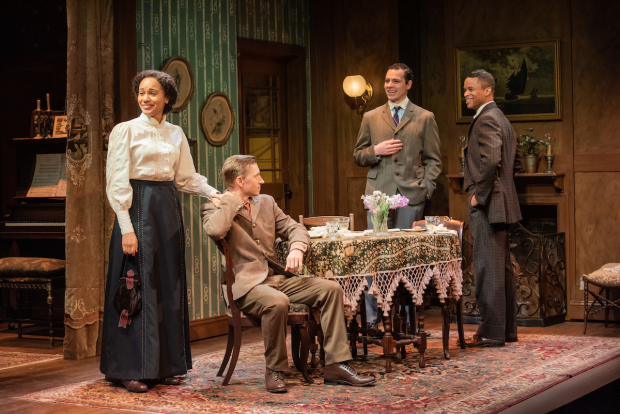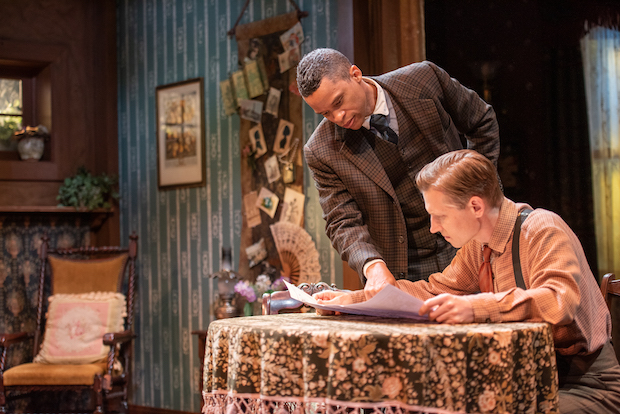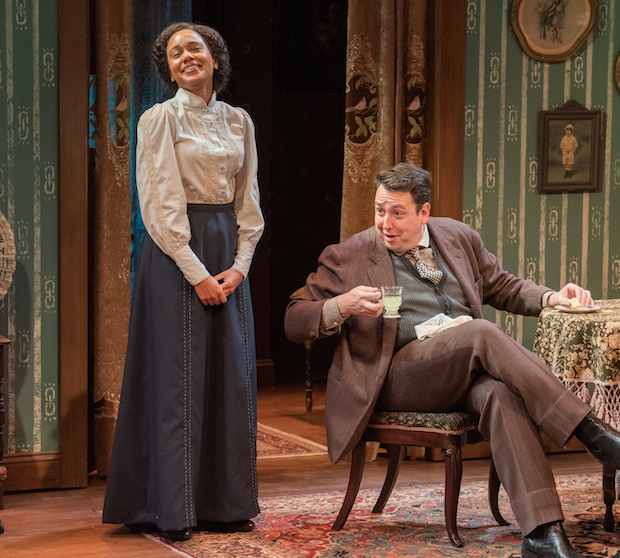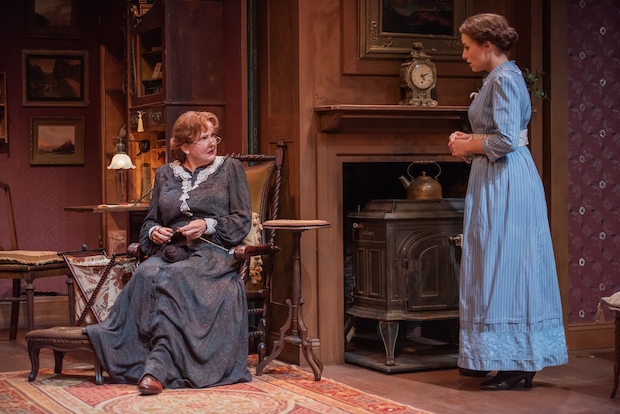Review: Chains Depicts an Edwardian Midlife Crisis
Mint Theater Company presents the American debut of Elizabeth Baker’s 1909 drama.

(© Todd Cerveris)
Do you ever feel like you're wasting your potential, devoting the best hours of your life to making other people richer while you accept their ever-diminishing table scraps, which they call your salary? You're not alone. You won't be the last person to feel that way, and you certainly aren't the first, as Elizabeth Baker reveals in her 1909 drama Chains, now making its American premiere with Mint Theater Company at Theatre Row.
This is the second Baker play Mint has produced, following 2019's The Price of Thomas Scott. Like that 1913 drama, Chains (which represented Baker's emergence onto the London theater scene) strikes at the flinty heart of Victorian conventional wisdom, creating plenty of sparks and heralding the social transformation to come. It's a worthwhile story to revisit as our society's inverse assumptions become increasingly stultifying and are primed for their own shake-up.

(© Todd Cerveris)
Our protagonist is Charley Wilson (Jeremy Beck), a lower-middle class London clerk who lives with his wife, Lily (Laakan McHardy), in a respectable (rental) house with a tiny garden in Hammersmith. To afford rent, they have a lodger, somewhat obviously named Mr. Tennant (Peterson Townsend). But when Tennant announces his intention to emigrate to Australia, Charley and Lily must find another — probably two since Charley has gotten a pay cut. While initially dismissive of Tennant's gamble, Charley wonders if he shouldn't just throw off his white-collar bondage and head Down Under.
Director Jenn Thompson leads the 15-person cast to create a tiny model of the social conditions that kept people like Charley miserable: Brian Owen is especially aggressive as Leslie, the next-door neighbor who is also a clerk, and who drowns out any nagging doubts about his own life with loud ridicule. Lily's father (Anthony Cochrane, emerged from a time machine) and mother (Amelia White, giving depth to a character whose first name is apparently "Mrs.") show what can come of a lifetime of conforming to expectations (they own their house). And Lily's younger brother, Percy (a wide-eyed Avery Whitted), looks to his limited future with optimism — he could even be head clerk if he puts his mind to it. "You don't mean to suggest, I hope," Percy asks Charley, "that we ought to like our work, do you?" And everyone in the room stifles a guffaw.

(© Todd Cerveris)
The only person who really sympathizes with Charley is Lily's sister, Maggie (an effortlessly acerbic Olivia Gilliatt), whose main reason for agreeing to marry her fiancé (Ned Noyes, appropriately wooden) is to get out of her job as a shop girl. Her dreams of the future seem to only have hubby as a footnote.
Connubial obligations drive the conflict, with Beck and McHardy delivering a particularly convincing portrait of a marriage. As he broods, she cheerfully encourages him to stay in his lane but swim faster, oblivious to any discontent (or Britishly ignoring it). Once she finally does let her shield down, the moment is heartbreaking and frightening. How is Charley ever to paddle against this tidal wave of emotional blackmail?

(© Todd Cerveris)
Once again, the Mint does justice to an obscure play with top-notch production values: John McDermott's set presents not one, but two fully realized turn-of-the-century English homes. Rather than performing the scenic transition during intermission, Thompson and McDermott wait until the top of Act 2 to execute it in under a minute, which becomes the most spectacular moment of the play (showoffs). David Toser's costumes give us a clear sense of period while contributing to the drama (Charlie's stiff white collar is an apt metaphor for his situation). Paul Miller creates pleasant natural light in the morning, and evenings illuminated by flickering gas. M. Florian Staab's soundscape (chirping birds, chiming church bells, a quietly ticking hallway clock) offers a realistic reminder of the ruthless forward motion of time.
Of course, more than a century has passed since Baker's play was first performed before a London audience. Now that we live in a time in which middle-class children are encouraged by everyone from the high-school guidance counselor to the Walt Disney Company to leave home and follow their bliss, are we happier? Or are we merely further adrift in a sea of choices (or at least the illusion of them)? Chains leaves audiences with these unanswered questions.









